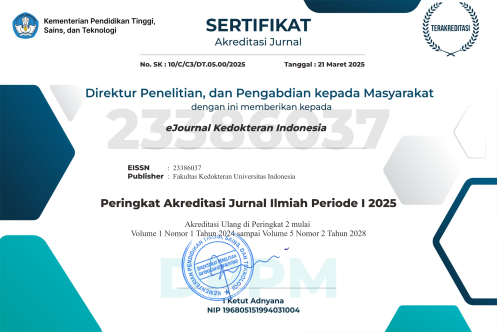Comparison of Visual Evoked Potential Latency and Amplitude Values According to Visual Acuity among Normal Adult Eyes in dr. Cipto Mangunkusumo Hospital
DOI:
https://doi.org/10.23886/ejki.12.492.55Keywords:
pattern reversal visual evoked potential, visual evoked potential, electrophysiology, reference value, visual acuityAbstract
Visual Evoked Potential (VEP) is a diagnostic procedure to evaluate pathological conditions affecting the visual pathway with several protocols, including pattern onset/offset VEP, flash VEP, and pattern-reversal VEP (PRVEP), standardized by International Society For Clinical Electrophysiology In Vision (ISCEV). PRVEP, the most common protocol used in clinical practice, is not always directly proportional to visual acuity (VA). Clarity of the refractory media and gender are presumed to affect it; thus, using PRVEP reference value based on refractory status is not casually applicable when the VA does not resemble refractory status. This study aims to determine the changes in VEP latency and amplitude value according to various subjective VA, and to examine and analyze these latency and amplitude values within male and female subject groups. The research was conducted at the Department of Ophthalmology, dr. Cipto Mangunkusumo Hospital from August to October 2017. Latency and amplitude values were measured with PRVEP. Measurement was performed on normal VA and defocus-induced VA to 6/18, 6/30, and 6/60 values, using small and large-sized checkerboard stimuli. Prolonged latency and decreased amplitude were found in male and female subject groups, corresponding with decreasing VA levels. Using 18 min arc and 48 min arc-sized checkerboards gave the closest result to the reference value. The difference in VEP value according to subjects' gender was found in amplitude but not in latency.
Downloads
Downloads
Published
How to Cite
Issue
Section
License
Copyright (c) 2024 Rommel Aleddin, Syntia Nusanti, M. Shidik, Aria Kekalih

This work is licensed under a Creative Commons Attribution-NonCommercial 4.0 International License.



